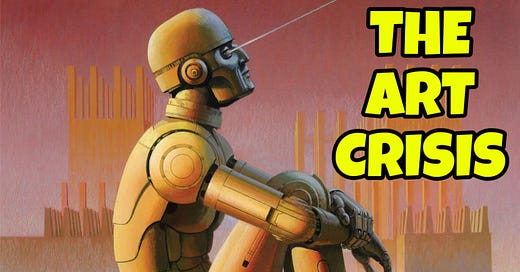Over the past six months, I’ve felt a creeping anxiety and frustration rising within me to an overwhelming degree in regards to AI generated content. These feelings shot through their glass ceiling with the recent announcement of Colin Kaepernick’s Lumi service and I knew it was finally time to take a public stance against AI “artwork" and AI “comics.” Funnily enough, I was already in the process of compiling what I would eventually dub my “Anti-AI Manifesto” when the Lumi news story broke, which only further bolstered my strong opinions on the controversial subject.
In the video above, I list eleven propositions that I believe everyone should adhere to and hold each other accountable to when it comes to AI generated content in the arts. I see this as a living document that can potentially be added to or amended as the years go on and this ever-complex conversation and debate continues to evolve. I fear much is at stake if we do not start putting these practices in place.
PROPOSITION #1 – That all AI generated content used in any creative endeavor, whether applied to images or words, shall be clearly labeled as such via a watermark or label, and made illegal to sell to publishers or customers of any kind, therefore making the content unable to earn a profit of any dollar amount.
PROPOSITION #2 – That all AI generated content used in any creative endeavor be listed under its own category as “AI” and the respective medium and genre. For example, “AI sci-fi comics” or “AI horror movies.” These are not comics. These are not movies. They are segregated to their own category of experimentation in technology, not art.
PROPOSITION #3 – That all users of AI generated content in any creative endeavor be ineligible of using “writer” or “artist” but rather “A.I. writer or prompter” and “A.I. artist or prompter.”
PROPOSITION #4– That all AI generated content that is purchased or sold incurs a fine and perpetual royalty to the seller and buyer. This fee, whether required to be applied annually or monthly, will be paid out to the creator (writer, artist, etc.) whose work it was originally derived from.
PROPOSITION #5 – That anyone applying for a job as a writer, artist, designer, editor, etc. are legally required by company policy of the employer to sign a document stating their agreement to never use AI during the creative process or in the work itself. If the contract is broken, the employee can be terminated from the position immediately.
PROPOSITION #6 – That anyone who is wrongfully accused of using AI in their work shall be compensated with interest for all lost sales and opportunities in response to either private or public defamation.
PROPOSITION #7 – That all writers and artists who are rightfully accused of using AI in their work will only be allowed to continue creating and to be employed after a thorough vetting process of future submissions.
PROPOSITION #8 – That all AI users are universally not allowed to purchase Artist Alley tables or participate in Artist Alley at comic-cons around the globe.
PROPOSITION #9 – That if there comes a point in time where AI content is accepted by the masses and eligible for sales, every sale incurs a royalty fee that must be paid to the artwork or creation that the AI content was originally derived from.
PROPOSITION #10 – That AI generated content in any creative endeavor, whether professionally or casually, be viewed solely as software experimentation and not as art.
PROPOSITION #11 - That any and all AI generated artwork is automatically ineligible and disqualified from entering into any artwork contest. Period.
What are your thoughts on my Anti-AI Manifesto? Agree? Disagree? Do you see any utility in using AI for storytelling purposes and why? Are you threatened by AI? What other propositions would you add to the list?
Let’s discuss.
- Nandor Fox Shaffer





I am on #TeamHuman. I would prefer to work with an actual living artist to something done by a computer on the cheap.
Well put! I think an important distinction needs to be made between AI, which powers everything from the YouTube algorithm to autocorrect, and generative AI, which should have stayed as a meme generator.
I wholeheartedly agree with Propositions 8 and 10, but sometimes the programmers themselves don’t understand the workings of their programs or the datasets they’ve used, making attribution or compensation difficult. I’m cautiously optimistic about this new copyright lawsuit! I’m sorry for going on so long. Thanks for another great newsletter!